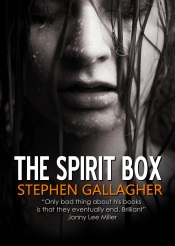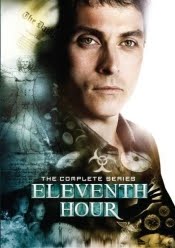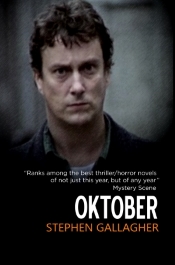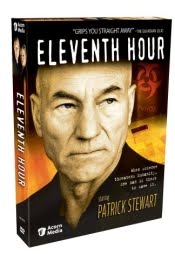To quote The Fast Show, this week I has mostly been watching Doctor Who.
I hadn't seen the show in at least a couple of years and, frankly, I took one look at Matt Smith in pre-publicity and thought WTF? He's twelve! and so wasn't too encouraged to visit again. The enthusiasm of friends did little to influence me because, frankly again, I have some dear friends who often enthuse about total crap.
For me, relaunched Who had been rather like Jonathan Creek, a steady evolution from the fresh and ingenious to the forced and ludicrous. In Creek's case I think the explanation was simple, over-working its creator instead of putting him in charge of a crew. I have no theory for why I went off Who. It wasn't because of Tennant, who (in disagreement with Good Dog) I thought was pretty good.
It was just that the episodes piled up on my DVR and when they've been doing that for a while, you know the technology is trying to tell you something. I singled out Blink and watched that, but only because it was Moffat and Moffat always seemed to think at right-angles to the routine. Blink was exceptional. But exceptions don't change the landscape, they just stick out of it. And the landscape seemed increasingly to consist of stories that often didn't work coupled with a grating obsession with chav culture.
All of this left me with mixed feelings about the achievement of Russell T Davies. Because let's face it, he did something remarkable. These days you can't move in the BBC without someone telling you how hard they fought to help the show get back on the air. But the truth is that until its popular success, Doctor Who was an object of institutional disdain. Its fans were ridiculed as sad, arrested people in love with ropy makeup and wobbly scenery. But I've said it before. No one ever loved Doctor Who for its bargain-basement production values. They loved it in spite of them. Davies pulled out the core values of the show and delivered something smart, modern, new, and entirely familiar.
But I think it was some time around 2007 that we were walking one weekend in the Yorkshire Dales, and fell in for a mile or so with an American backpacker of around thirty years old who volunteered that he was a Doctor Who fan. I didn't mention that I had any connection with the show. I tend not to in those situations. Partly because my experience must seem like ancient history (I was 25 when I wrote Warriors' Gate) and partly because I don't want to be taken for a liar or, even worse, a smug twat.
But of RTD he said, "The episodes that he produced and didn't write are always better than the ones with his name on them." Which pretty much nailed the thought that I'd been circling around. I was letting stories that I didn't enjoy colour my appreciation of a producing triumph.
So, fast forward. Over the Easter weekend I borrowed the Season 5 boxed set, mainly to try out the new Blu-Ray player that I'm too cheap to buy discs for. I was only going to sample an episode but I've been charging through them at the rate of three a night. Smith's as good as they say. Better, even. I still think he's twelve but it's not the problem I imagined. It's a less sentimental, more honestly-felt show and I think Moffat's nailed it with his Peter Pan/Wendy take on the core characters and their situation.
OK, I'm back in. By Saturday I'll have caught up.
But here's something. While I was on hiatus from Who, I did watch Sherlock. And during my week-long blitz something jumped out at me.
They're the same characters. It's the same show.
Wednesday 27 April 2011
Tuesday 12 April 2011
Valley of Lights
It's going great, but the 99c introductory Kindle price on Valley of Lights ends on April 20th. After that, it's back to the full price. Valley was my 'breakthrough book' and is still available in print, in a Telos Classics edition incorporating notes, an interview, and a bonus story.
But you can click here to buy the straight-goods Kindle edition, and for the full range of my available eBooks see the Top Suspense Group website.

But you can click here to buy the straight-goods Kindle edition, and for the full range of my available eBooks see the Top Suspense Group website.

When Phoenix Police Sergeant Alex Volchak discovers the true nature of a predator that has survived among us unnoticed for generations, he puts himself and those around him in mortal danger. "An excellent thriller... a cracking pace... large helpings of deadpan gallows humour... a genuine ability to create a sense of evil." Evening Times "The best fusion of crime and horror since Hjortsberg's Falling Angel." Time Out
Saturday 2 April 2011
The Killing
The Seattle-set US version of Danish superdrama The Killing begins its run on Sunday. I'm tempted to go overboard and say that the original is one of the best things I've seen on TV, ever. But then I'd start to sound like one of those people who go on and on about The Wire. And I wouldn't want that.
(But it is.)
To steal my own comment from Good Dog's blog I think that The Killing (Forbrydelsen) is near-perfect TV, balancing an adult sensibility with a pulpish must-see narrative drive, nicely under-written and finely nuanced. The personal/professional gavotte of Lund and Meyer is like a masterclass in character work.
So where does that quality come from? What do the Danes know that we seem to have forgotten? The Guardian newspaper sent reporter Stuart Jeffries over to Copenhagen to interview cast and creators for this illuminating piece.
Most illuminating for me was the fact that both Sophie (Sarah Lund) Grabol and Lars (Troels Hartmann) Mikkelson made time for their interviews between rehearsals for, respectively, a staging of Ingmar Bergman's Fanny and Alexander, and Moliere's The Misanthrope. Danish television's talent gets its drive, class and craft from classical theatre, where ours is now rooted in soaps.
A New York Times interview with showrunner Veena Sud indicated that the US version would add to the backstories of some of the main characters. She also referred to the investigation being 'stretched' over 13 episodes, which I hope was just an unfortunate choice of words. Forbrydelsen's twenty hours were another masterclass, this time in long-distance story management.
(Speaking of unfortunate choices; I just mistyped 'showruinner', which is no reflection on Ms Sud but which I intend to copyright for some future use.)
In answer to the question, "Why remake The Killing at all?" I'd say this; if the remake captures any of the quality of the original, then there's an exceptional treat awaiting viewers for whom a subtitled Danish thriller is an insurmountable climb. Which, on the evidence of numbers, is most of the English-speaking world.
I won't be watching. Not out of protest or a sense of superiority, but because there's no point. I don't want to be the annoying guy who can't shut up about what they've missed or what they've changed. But I don't want to hear about those added backstories, either. So much that was effective for me in the original lay in what went unsaid.
I'll probably sample it out of professional curiosity. But as a viewer I don't want my memories overwritten, much as I don't want to hear lyrics added to Khachaturian's adagio from Spartacus (someone has).
And besides, I'll be busy. Spiral series 3 starts tonight.
(But it is.)
To steal my own comment from Good Dog's blog I think that The Killing (Forbrydelsen) is near-perfect TV, balancing an adult sensibility with a pulpish must-see narrative drive, nicely under-written and finely nuanced. The personal/professional gavotte of Lund and Meyer is like a masterclass in character work.
So where does that quality come from? What do the Danes know that we seem to have forgotten? The Guardian newspaper sent reporter Stuart Jeffries over to Copenhagen to interview cast and creators for this illuminating piece.
Most illuminating for me was the fact that both Sophie (Sarah Lund) Grabol and Lars (Troels Hartmann) Mikkelson made time for their interviews between rehearsals for, respectively, a staging of Ingmar Bergman's Fanny and Alexander, and Moliere's The Misanthrope. Danish television's talent gets its drive, class and craft from classical theatre, where ours is now rooted in soaps.
A New York Times interview with showrunner Veena Sud indicated that the US version would add to the backstories of some of the main characters. She also referred to the investigation being 'stretched' over 13 episodes, which I hope was just an unfortunate choice of words. Forbrydelsen's twenty hours were another masterclass, this time in long-distance story management.
(Speaking of unfortunate choices; I just mistyped 'showruinner', which is no reflection on Ms Sud but which I intend to copyright for some future use.)
In answer to the question, "Why remake The Killing at all?" I'd say this; if the remake captures any of the quality of the original, then there's an exceptional treat awaiting viewers for whom a subtitled Danish thriller is an insurmountable climb. Which, on the evidence of numbers, is most of the English-speaking world.
I won't be watching. Not out of protest or a sense of superiority, but because there's no point. I don't want to be the annoying guy who can't shut up about what they've missed or what they've changed. But I don't want to hear about those added backstories, either. So much that was effective for me in the original lay in what went unsaid.
I'll probably sample it out of professional curiosity. But as a viewer I don't want my memories overwritten, much as I don't want to hear lyrics added to Khachaturian's adagio from Spartacus (someone has).
And besides, I'll be busy. Spiral series 3 starts tonight.
Ed Gorman, Dickens, Stale Popcorn, and Frescoes
I see that Ed Gorman's short story collection Noir 13 is up for a 2011 Spinetingler Award. With all due respect to the other nominees I hope it picks up a ton of votes and wins.
My first encounter with Ed was as the editor of Mystery Scene magazine. Later I had a story picked up for an anthology on which he was one of the editors. Most recently I've come to know him as a fellow and founder-member of the Top Suspense Group.
From the beginning I've regarded him as a kind of godfather to all the rest of us working in that loose genre group often called crime and mystery. If you follow the blog you may recall that a while back I contributed an intro to the PS Publishing edition of Ed's novel Cage of Night.
I used the opportunity for a riff or a rant about style and professionalism. Not dying arts, but certainly increasingly neglected ones.
Voting in the Spinetingler Awards is open until April 30th. I'm happy also to see follow Top Suspenser Dave Zeltserman nominated in the Rising Star category for his novel Killer.
My first encounter with Ed was as the editor of Mystery Scene magazine. Later I had a story picked up for an anthology on which he was one of the editors. Most recently I've come to know him as a fellow and founder-member of the Top Suspense Group.
From the beginning I've regarded him as a kind of godfather to all the rest of us working in that loose genre group often called crime and mystery. If you follow the blog you may recall that a while back I contributed an intro to the PS Publishing edition of Ed's novel Cage of Night.
I used the opportunity for a riff or a rant about style and professionalism. Not dying arts, but certainly increasingly neglected ones.
There’s a type of writing which I grew up loving, which made me want to be a writer myself, and which for a while I thought was gone forever. I'm talking about spare, intelligent commercial fiction. Pan paperbacks, crime novels, spy fiction, postwar British thrillers... writers from Gavin Lyall to Graham Greene, from John Le Carré to John D MacDonald. Well-paced novels that were as long as they needed to be and not a page longer, from authors with a grip on the English language as precise as a sculptor's on his chisel. Like a sculptor they wasted no strokes, and like a sculptor they had little margin for error.Since I wrote the piece, Hard Case Crime faced some uncertain times with the collapse of Dorchester Publishing, which handled production and distribution of its titles. A new partnership with Titan Books looks set to allow the line to continue.
Their work is light, racy, and full of substance. By “light”, I don't mean frivolous. I mean with a deceptive lightness of touch, an easy sense of direct connection, a sense that the writer’s first job is always to engage the reader. Rather like the effortless people-person who spots you arriving at a party, makes you feel instantly welcome, and starts introducing you around. You know the type. Born diplomats. Even if you don't know them well, they seem to know you. It's a special thrill when they remember your name.
Ah, those books! Well-crafted popular fiction. They came out of a tradition going all the way back to Dickens and beyond. It was storytelling, pure if not always simple. The best writers understood that storytelling wasn't some lower form of literature. It was the ticket to ride, allowing any and all of the freight of literature to be checked in to ride along with it.
(Although it has to be said that some of the writers I enjoyed travelled pretty light, and at their worst could rattle off a nifty 50 or 70,000 words and leave you with very little of permanence beyond the aftertaste of the narrative. But in itself that’s no mean feat. When you think about it, what thousand-dollar bottle of wine has ever achieved more?)
I did my best to spot the good stuff wherever it appeared. However lurid the cover, however downmarket the genre, I’d be drawn to those elements that signalled an intelligent writer with a serious mind, ready to step up to the campfire and put all his energies into riveting our attention, filling us with joy and awe, and leaving us feeling exactly the way that he’d planned for us to feel. When an artist writes straight from his or her nerve endings, without engaging in a long process of study and philosophical meditation, that doesn't automatically devalue the act of creation. Fresco painters didn't get a lot of time to mull over what they were doing, either. It's hard to imagine a more ruthless deadline than four square yards of drying plaster; hard to envisage a greater test of one's craft, or a more compelling goad to invention.
For a few years that kind of writing seemed to vanish from the shelves, driven out by so-called bloat books and 'thick fiction' that look like good value and taste like stale popcorn. A 70,000-worder, in the words of one publishers' rep to me, was deemed "too cheap, and too thin". Marketing was no longer being driven by content; content was being driven by marketing.
Cage of Night, dare I suggest it, was probably a victim of that trend.
In its author's words, "Back in the 90s I wrote a novel called Cage of Night. I liked it but many many publishers didn't share my enthusiasm. The complaint was that they couldn't figure out if it was a crime novel or horror fantasy. How do you market it? The publisher that finally took it on decided to experiment with their returns policy. I'm told, though I don't know this for a fact, that when they told the chains no returns, the book was stillborn."
Well, let me just say something about that... the returns business rings depressingly true, and the mindset that drove it probably explains why it's become possible to walk through an entire book barn and still find nothing you particularly want to read. But I reckon that the reason given by the 'many many publishers' for turning the novel down is the very thing that makes the book.
What’s great about Cage of Night is the line that it walks. On the one hand, there are stories that deny the world of the imagination and couch themselves entirely in the terms of the banal – "the low mimetic", as Angela Carter called it.
At the other end of the reality spectrum there are those narratives where fancy drifts without anchor, tales of wish fulfilment in which no effort is spent devising how those wishes might be fulfilled – they simply are. Chosen ones are chosen, destinies are fulfilled, and whatever powers might be needed are available when summoned.
But somewhere, with all these loose pieces lying to left and right of it, there is a middle way where the two come together and forge something else. A form of storytelling in which the feel of a life is wholly believable yet charged with an imminent sense of gods and monsters, all rooted in the weird and wonderful thing that is human psychology. It’s the way we viewed the world every day as children, a power of vision that our growing-up inevitably taught us to suppress. The right kind of story can take us there again – ultimately, it's what stories are for.
The qualities that I thought had gone for good, driven out of the market by ghosted celebrity novels, hasty journalist-written chick-lit, and lazy big-name franchising, have simply resurfaced in unexpected places. These days my fiction reading pile tends to consist of two kinds of novel. There are the trade editions from the literary shelves, where people like Jonathan Lethem and Michael Chabon aim for high art with a pulpster's vigour. Then there's the stuff in reprint, from a growing number of houses dedicated to ferreting out and celebrating the eminently readable; Charles Ardai's Hard Case Crime takes the strategy one stage further, commissioning new work from classic cover artists so that the books begin to sing even before you've got them open.
Ed Gorman stands right at the core of everything I’ve been talking about. A master craftsman, a professional's professional, and a steady, reliable, original voice. He writes with intelligence and grace, about people we can believe in, facing situations we can imagine, reacting in ways that are truthful. He makes it real, and in his hands that reality can soar.
Voting in the Spinetingler Awards is open until April 30th. I'm happy also to see follow Top Suspenser Dave Zeltserman nominated in the Rising Star category for his novel Killer.
Friday 1 April 2011
Subscribe to:
Posts (Atom)




































